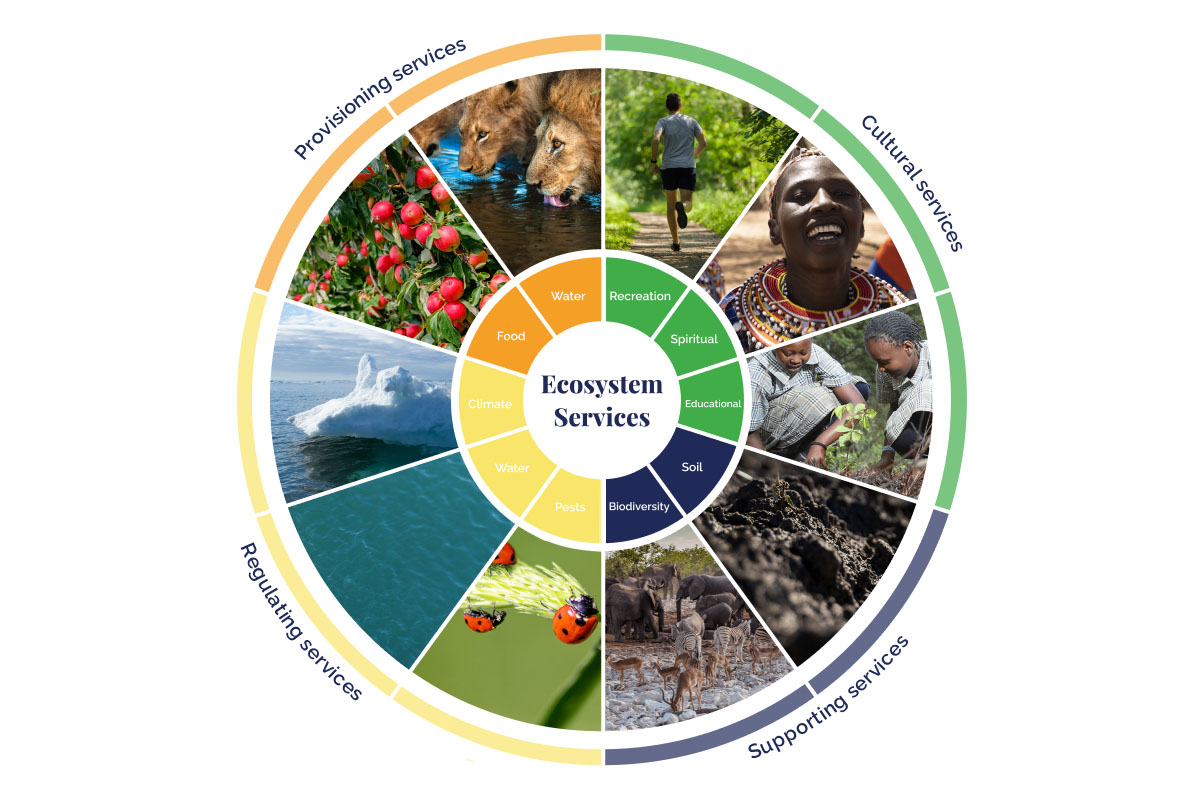
Ecosystem services are an integral part of our natural environment, offering a wide range of benefits that support our well-being and the functioning of the planet. From providing clean water and air to regulating climate and pollination, ecosystem services play a crucial role in sustaining life on Earth.
While we may be familiar with some of the more commonly known ecosystem services, such as food production and timber, there are several surprising facts that shed light on the true extent and importance of these services. In this article, we will explore 14 intriguing facts about ecosystem services that will enhance your understanding and appreciation for the vital role they play in our lives.
Key Takeaways:
- Ecosystem services are essential for human survival, providing clean air, water, and food. They also offer cultural, social, and economic benefits, but are often undervalued and need conservation efforts.
- Forests, wetlands, bees, and other natural elements provide vital ecosystem services, such as carbon sequestration, water purification, and pollination. Protecting and restoring these habitats is crucial for human well-being.
Ecosystem services are essential for our survival.
Ecosystem services refer to the benefits that humans derive from the natural environment, such as clean air, fresh water, and food production. Without these services, our very existence would be at stake.
Ecosystem services are not limited to environmental benefits.
While the term “ecosystem services” often brings to mind ecological processes, it also encompasses cultural, social, and economic benefits. These may include recreational activities, spiritual and cultural values, and even contributions to the economy through tourism and job creation.
Ecosystem services are often undervalued.
Despite their immense importance, ecosystem services are often taken for granted and undervalued. This can lead to overexploitation and degradation of natural resources, resulting in negative consequences for both the environment and society.
Forests provide valuable ecosystem services.
Forests play a crucial role in providing ecosystem services. They act as carbon sinks, helping to mitigate climate change, and also provide habitat for countless species. Additionally, forests are important for water regulation, erosion control, and timber production.
Wetlands are vital for water purification.
Wetlands, such as marshes, swamps, and bogs, are natural filters that help to purify water by removing pollutants and excess nutrients. They also provide habitat for numerous plant and animal species.
Bees are key pollinators.
Bees and other pollinators play a crucial role in ecosystem services by facilitating the pollination of plants. This process is essential for the reproduction of flowering plants and the production of fruits and seeds.
Mangroves protect coastlines.
Mangroves are trees and shrubs that grow in coastal areas, and they provide valuable ecosystem services. They act as natural barriers against storm surges and provide habitat for various marine species.
Coral reefs support marine biodiversity.
Coral reefs are incredibly biodiverse ecosystems that support a wide array of marine species. They protect coastlines from erosion, provide a habitat for fish and other organisms, and are a major tourist attraction.
Ecosystem services are essential for agriculture.
Agriculture heavily relies on ecosystem services such as pollination, nutrient cycling, and soil fertility. These services are crucial for crop production and ensuring food security.
Ecosystem services can be enhanced through conservation and restoration efforts.
By protecting and restoring natural habitats, we can enhance ecosystem services and reap the benefits they provide. This includes actions such as reforestation, wetland restoration, and implementing sustainable land management practices.
Urban green spaces provide ecosystem services in cities.
Green spaces in urban areas, such as parks and gardens, offer a range of ecosystem services. They help to improve air quality, regulate temperature, reduce urban heat islands, and provide recreational opportunities for city dwellers.
Ecosystem services are interconnected.
Ecosystem services are interconnected and rely on the balance and functioning of natural systems. Disruptions to one service can have cascading effects on others, highlighting the importance of maintaining ecosystem health.
Indigenous communities are custodians of ecosystem services.
Indigenous communities have been practicing sustainable resource management and conservation for generations. Their traditional knowledge plays a vital role in maintaining ecosystem services and promoting biodiversity conservation.
The loss of ecosystem services can have severe consequences.
When ecosystem services are compromised or lost, it can have far-reaching consequences for human well-being. This can include declines in food production, water scarcity, increased vulnerability to natural disasters, and the loss of cultural and spiritual connections to the natural world.
Conclusion
Ecosystem services play a vital role in the survival and well-being of both humans and the environment. The 14 surprising facts about ecosystem services highlighted in this article shed light on the diverse and often underestimated benefits that our ecosystems provide. From regulating climate and water quality to supporting agriculture and providing recreational opportunities, these services are crucial for our everyday lives.
Understanding and valuing ecosystem services is essential for promoting sustainable development and making informed decisions regarding land use and conservation. By recognizing the intricate web of relationships between nature and human well-being, we can work towards preserving and restoring ecosystems for future generations.
Let’s continue to appreciate and protect our ecosystems, for they are truly invaluable.
FAQs
1. What are ecosystem services?
Ecosystem services are the benefits that ecosystems provide to humans and the environment. These include products such as food, water, and timber, as well as processes like climate regulation, pollination, and soil formation.
2. Why are ecosystem services important?
Ecosystem services are important because they contribute to human well-being, support economic activities, and help maintain a healthy environment. They provide vital resources and functions that are essential for the survival and development of societies.
3. How can we protect ecosystem services?
We can protect ecosystem services by promoting sustainable land use practices, conserving biodiversity, restoring degraded ecosystems, and implementing policies that value and integrate nature into decision-making processes. It is also crucial to raise awareness and educate people about the importance of ecosystem services.
4. Can ecosystem services be measured?
Yes, ecosystem services can be measured through various approaches such as economic valuation, ecological monitoring, and stakeholder engagement. These methods help quantify the benefits provided by ecosystems and assist in making informed decisions about their management and conservation.
5. Are ecosystem services only provided by natural ecosystems?
No, ecosystem services can also be provided by managed or constructed ecosystems. For example, agricultural systems can provide food production services, and urban parks can offer recreational and cultural services. However, undisturbed natural ecosystems often provide a wider range of services and have higher ecological value.
Was this page helpful?
Our commitment to delivering trustworthy and engaging content is at the heart of what we do. Each fact on our site is contributed by real users like you, bringing a wealth of diverse insights and information. To ensure the highest standards of accuracy and reliability, our dedicated editors meticulously review each submission. This process guarantees that the facts we share are not only fascinating but also credible. Trust in our commitment to quality and authenticity as you explore and learn with us.


